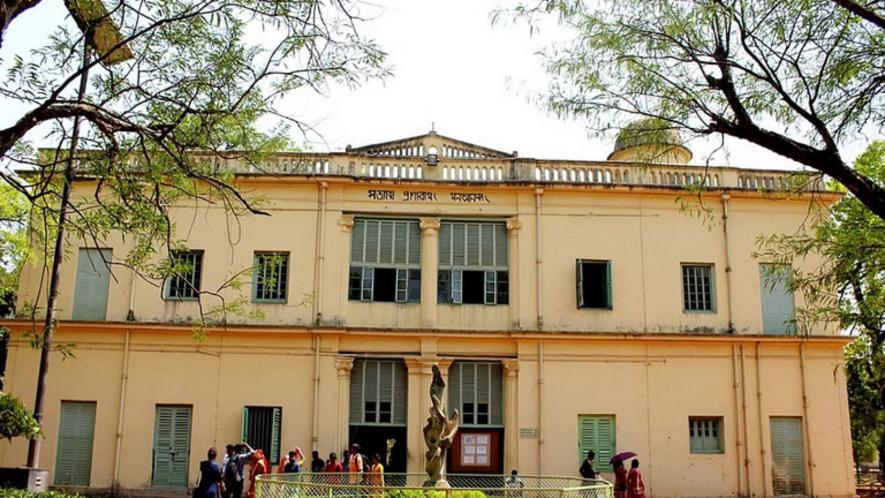Tagore's Shantiniketan Gets World Heritage Status Amidst Celebration by Ashramiks

Image Courtesy: National Herald
Kolkata: Shantiniketan, the tranquil haven established by Maharshi Debendranath Tagore and later expanded by his renowned son Rabindranath Tagore in West Bengal's Birbhum district, has achieved recognition on the UNESCO list of world heritage sites.
In its declaration, UNESCO stated, "Founded in rural West Bengal in 1901 by the esteemed poet and philosopher Rabindranath Tagore, Santiniketan was a residential school and center for the arts, rooted in ancient Indian traditions and a vision of human unity transcending religious and cultural boundaries. A 'world university' was established at Santiniketan in 1921, known as 'Visva Bharati,' signifying the unity of humanity. Diverging from prevalent British colonial architectural trends of the early 20th century and European modernism, Santiniketan embodies a path towards a pan-Asian modernity, drawing from ancient, medieval, and folk traditions across the region."
The declaration has filled the hearts of Shantiniketan's residents, particularly the esteemed Ashramiks—individuals who have embraced Tagore's ideology and live in Shantiniketan, away from the materialistic world—with immense joy.
Supriyo Tagore, great-grandson of Satyendranath, was a student at Patha Bhavana and Visva Bharati University before pursuing further education abroad. He served as the longest-serving principal of Patha Bhavana before retiring. Presently, he oversees Sisu Tirtha, an institution primarily catering to economically disadvantaged tribal orphans near Santiniketan. His son, Sudripta, who possesses extensive experience in education, is also involved in establishing a school near Santiniketan, embodying Rabindranath's ideas.
Supriyo now resides in Shantiniketan and is among the few remaining members of the Tagore clan in Shantiniketan. Speaking to NewsClick, the 86-year-old could not conceal his joy at the news. He said that as an Ashramik, it brings immense pride and a sense of responsibility to all stakeholders of Shantiniketan, who should eloquently shoulder this responsibility.
Subir Bandhyapadhya, another septuagenarian Ashramik and secretary of the Ashramik Sangha, founded by Rabindranath, stated that it is a day of hope for the entire community and those who cherish Tagorean values. This recognition demonstrates that Tagore's ideals, in contrast to narrow interests, possess inherent virtue and should be propagated, especially in the contemporary Indian context, he said.
It remains uncertain whether the recognition pertains to Shantiniketan's architecture and ambience or the entire aura of Shantiniketan and the continued open-air teachings at Viswabharati, which Tagore ardently advocated for, Bandhyapadhya said. He added that much work lies ahead to safeguard Tagorean values from contemporary attacks.
Shnatavanu Sen, another septuagenarian Ashramik born in Shantiniketan in 1952 and a cousin of Nobel laureate Amartya Sen, expressed his happiness and immense pride that this cherished recognition has come to Tagore's Karma Bhumi.
He emphasised the importance of preserving the heritage associated with Tagore, including stalwart artists like Nandalal Basu, Ramkinkar Baij, and Benode Behari Mukherjee, not to mention the noted singers who once resided in Shantiniketan.
According to Prof. Pabitra Sarkar, a renowned linguist and former VC of Rabindrabharati University, this recognition honours the aura of the past more than the current events at Viswabharati, which are unworthy of mention.
Goutam Ghosh, a well-known Tagorite and member of the CPI(M) state committee from Bolpur near Shantiniketan, remarked that the UNESCO declaration places added responsibility on students, teachers, and all those associated with Viswabharti and Shantiniketan. He alleged that central universities across the country are currently facing attacks from the ruling regime attempting to appropriate institutional heritage, and Viswabharati, as a Tagorean institution, is no exception. In such a challenging environment, recognising Shantiniketan and its ideals is a cause for celebration among those who hold Tagore's ideals dear, he said.
Professor Anjan Bera of Calcutta University highlighted the eloquent words of the UNESCO declaration, underscoring that Tagore established his global connectivity through Shantiniketan, his magnificent creation. He noted the concept of unity amid diversity through Shantiniketan, exemplified by structures like Cheena Bhawan. Preserving Tagorean values and ideals is now imperative, he underscored, saying that the need to preserve his pluralistic visions and common heritage is reflected in this UNESCO declaration.
Get the latest reports & analysis with people's perspective on Protests, movements & deep analytical videos, discussions of the current affairs in your Telegram app. Subscribe to NewsClick's Telegram channel & get Real-Time updates on stories, as they get published on our website.
























